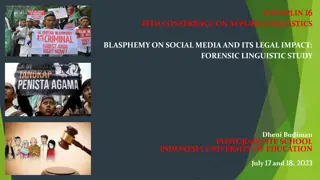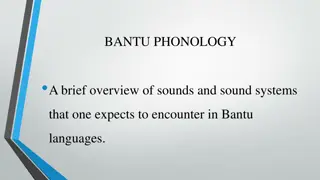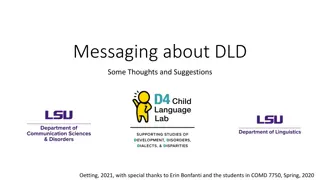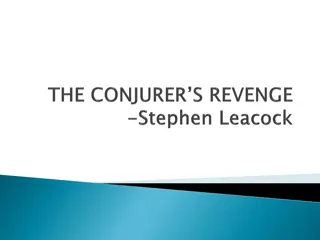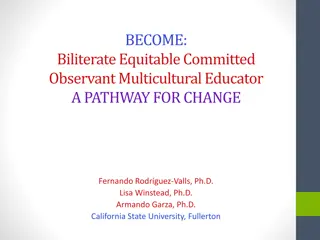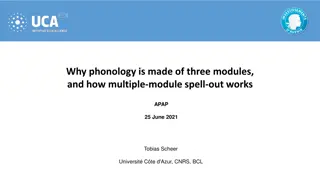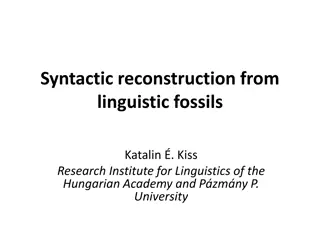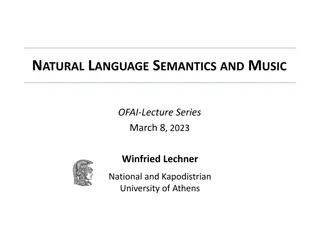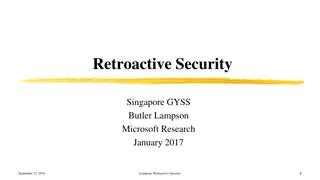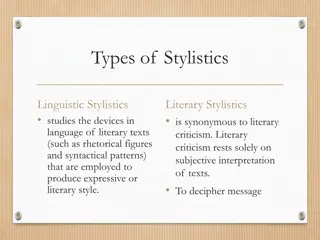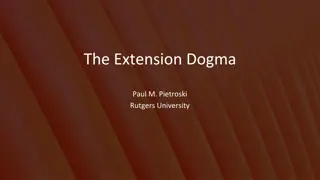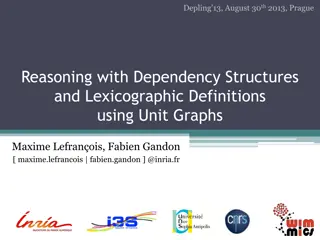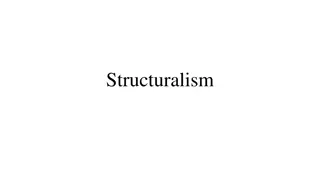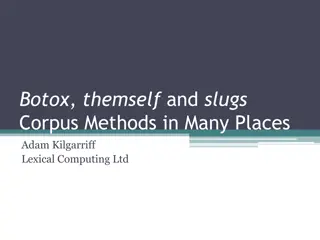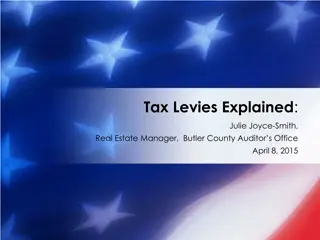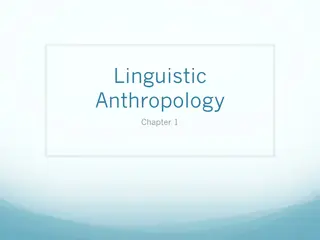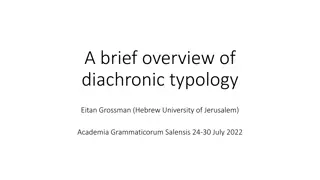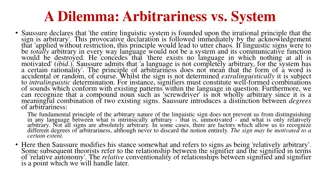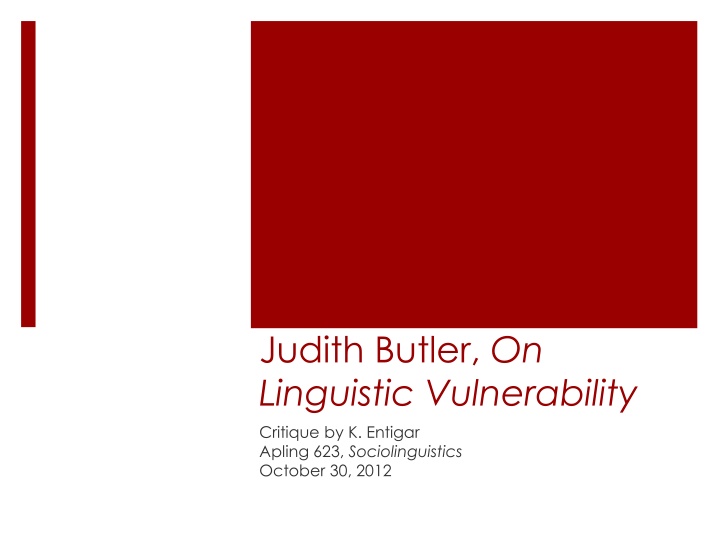
Linguistic Agency and Hate Speech Consequences
Explore the concepts of linguistic vulnerability, hate speech, and linguistic agency as discussed by Judith Butler. Analyze a dialogue highlighting the impact of language on identity and social positioning. Delve into subjectification and interpellation as linguistic processes that shape social existence and intersubjectivity.
Download Presentation

Please find below an Image/Link to download the presentation.
The content on the website is provided AS IS for your information and personal use only. It may not be sold, licensed, or shared on other websites without obtaining consent from the author. If you encounter any issues during the download, it is possible that the publisher has removed the file from their server.
You are allowed to download the files provided on this website for personal or commercial use, subject to the condition that they are used lawfully. All files are the property of their respective owners.
The content on the website is provided AS IS for your information and personal use only. It may not be sold, licensed, or shared on other websites without obtaining consent from the author.
E N D
Presentation Transcript
Judith Butler, On Linguistic Vulnerability Critique by K. Entigar Apling 623, Sociolinguistics October 30, 2012
Starting discussion: Analysis of a dialogue A: So, I watched the basketball game last night between -- a little bit of Rutgers and Tennessee, the women's final. B: Yeah, Tennessee won last night -- seventh championship for [Tennessee coach] Pat Summitt, I- Man. They beat Rutgers by 13 points. A: That's some rough girls from Rutgers. Man, they got tattoos and -- C: Some hard-core hos. A: That's some nappy-headed hos there. I'm gonna tell you that now, man, that's some -- woo. And the girls from Tennessee, they all look cute, you know, so, like -- kinda like -- I don't know.
Starting discussion: Analysis of a dialogue A: So, I watched the basketball game last night between -- a little bit of Rutgers and Tennessee, the women's final. B: Yeah, Tennessee won last night -- seventh championship for [Tennessee coach] Pat Summitt, I- Man. They beat Rutgers by 13 points. A: That's some rough girls from Rutgers. Man, they got tattoos and -- C: Some hard-core hos. A: That's some nappy-headed hos there. I'm gonna tell you that now, man, that's some -- woo. And the girls from Tennessee, they all look cute, you know, so, like -- kinda like -- I don't know.
Hate speech and injury through language use Outside the law: Hate speech is, outside the law, communication that vilifies a person or a group on the basis of color, disability, ethnicity, gender, nationality, race, religion, sexual orientation, or other characteristic. - Wikipedia hate speech speech vs. conduct Under the law: agency In law, hate speech is any speech, gesture or conduct, writing, or display which is forbidden because it may incite violence or prejudicial action against or by a protected individual or group, or because it disparages or intimidates a protected individual or group. - Wikipedia subject object Important point JB: We ascribe an agency to language, a power to injure, and position ourselves as the objectsof its injurious trajectory. (1)
Naming, subjectification, and interpellation The power of the name: Naming is a language convention (ex: new baby) Subjectification (Foucault): The linguistic process of becoming a subject. name/naming subjectification Interpellation (Althusser): The positioning of a subject into a social/political context subject o may occur without the addressee s knowledge o may be ineffective o may not require the act of speaking (ex: census taking) Being named subjectification interpellation linguistic/social/political existence interpellation
Subjectification and intersubjectivity Subjectification Process of social constitution which acts on us from outside subjectification social constitution As subjects, we also have the power to use names and, thus, act on others intersubjectivity Important linguistic relationship: intersubjectivity (the speaker is also socially constituted by the speech act he/she uses)
How can a name cause injury? Naming s illocutionaryforce is performative ex: I sentence you to 10 years in prison. saying someone s name effects their identity, situating them at the time of speaking (temporal) illocutionary force Other statements have a constative illocutionary force (descriptive) ex: I m hungry. may have consequences, but they are separate from the moment of speaking (atemporal) performative vs. constative temporal vs. atemporal Thus, hate speech may have a performative illocutionary force because its utterance produces a subordinating, derogating, demeaning effect (ex: abusive father calling his daughter a bitch )
The power of the name itself However, this doesn t mean that any name which is intended to injure is effective. ex: Calling someone a bloopo-stein. Q: Why doesn t this name cause any pain (unless perhaps between 3-year-olds)?
An injurious name has historicity. Injurious speech acts invoke power because the speaker and hearer(s) perceive their illocutionary force. Hate speech is recognizable. ritualization historicity JB: Illocutionary utterances do what they say on the occasion of the saying and yet to the extent that the moment is ritualized [repeated in time, conventional], it is never merely a single moment. (3) Racist/sexist/heterosexist names have illocutionary force through historicity; a name is a linguistic substitution for a trauma which is encoded by iterative usage
Pit stop: why Butler is so challenging Discussion of Matsuda, Morrison, Felman, Foucault: If language can sustain the body, it can also threaten its existence. (5) threats as potentially performative (effecting the threat itself through their very utterance), linguistic wounding Discussion of Morrison (parable about children with bird and old woman) language as its OWN agency (not just belonging to the speaker) as both instrument and user of instrument our speaking bodies are never fully aware of the language they are doing salient point (for KE): an injurious speech act is made through speaking, not through the language alone (11)
Hate speech and subordination JB discussion: what hate speech does is to constitute the subject in a subordinateposition (18) constitution of a subject hate speech = site of reproduction of power (Matsuda) subordinate (vs. superordinate) The subject who speaks hate speech is clearly responsible for such speech, but that subject is rarely the originator of that speech. Racist speech works through the invocation of convention it neither begins nor ends with the subject who speaks or with the specific name that is used. (34) reproduction of power
Censorship and the illocutionary model of hate speech Should hate speech be viewed as conduct rather than speech in the legal sense? conduct vs. speech JB: If we perceive any hate speech acts as illocutionary [ injuring in and through the moment of speech (24)]: speech = conduct, and therefore hate speech = injurious conduct justification for bypassing 1st Amendment result: state intervention becomes necessary to protect citizens
Political climate and defining hate speech Q: What is the illocutionary force of: pornography? burning a cross on an African-American s lawn? illocutionary force: performative vs. constative R.A. V. vs. St. Paul (1992): has performative illocutionary force, because it subordinates the viewer at the moment of utterance has constative (descriptive) illocutionary force only Reasoning: Obscenity which includes the most lascivious displays of sexual activity can be proscribed (banned), but political (racist) messages cannot Possible interpretation sexist speech = NOT okay, should be limited racist speech = expressive of one s individual opinion
Censorship Butler and state interventionism: In many ways, this very extension of state power comes to represent one of the greatest threats to the discursive operation of lesbian and gay politics. (22) discursive operation Q: Do you agree? Why? (Hint: Who is the regulator of speech? How does the ability of a subject to invoke convention, or modify it, change under these conditions?) intersubjectivity Q: How would the role of intersubjectivity also be impacted?
JBs response: restaging and resignification [T]he changeable power of [hate speech] marks a kind of discursive performativity that is not a discrete series of speech acts, but a ritual chain of resignifications whose origin and end remain unfixed and unfixable. (14) discursive performativity resignify/resignifi cation Ex: the reappropriationof the term queer in queer politics & theory => non-assimilationist (vs. deviant ) reappropriation Butler: In the case of hate speech, there appears to be no way to ameliorate its effects except through its recirculation censorship, by limiting the use of names, [preserves] their power to injure (37-38)
Confronting legal precedent and political climate In the current U.S. political climate, the law that decides the question of hate speech tends to be applied inconsistently in order to further reactionary political aims (39) cites examples of banning of expression of one s sexuality (Don t Ask Don t Tell) contrast to views of racist speech critical agency Importance of critical agency when considering hate speech dialogue, not removal from permissable speech, will allow critical reading
Conclusion Butler: As we consider a release of our language from censorship, the saying of the unspeakable become[s] part of the very offense that must be committed in order to expand the domain of linguistic survival (41) If we are to modify the meaning of injurious names, we must be willing to run the risk of committing injury, through critical analysis and dialogue, in order to change the linguistic and social conventions contained in their use which continue to subordinate.
Questions 1. Can you give an example from your own personal experience of how a word which was injurious in one context was resignified in another? Have you ever done this yourself? 2. How would you manage a situation in a classroom in which a student of yours used an injurious name? How (and why) would your choices as an educator depend on the age of the learner, the composition of the class, etc.? 3. Do you believe in censorship? What role, if any, do you believe that religion, politics, and other socially powerful factors play in defining what should be censored?
* Additional activity * Discuss these song lyrics in terms of the concept of resignification and intersubjectivity. (The singer is a woman singing to a man.) tonight you stooped to my level i am your mangy little whore you are trying to find your underwear and then your socks and then the door and you're trying to find a reason why you have to leave i know it's 'cuz you think you're adam and you think i'm eve

